题目内容
1.It is universally _________________(承认) that great changes have taken place since the new policy.
2.Professor Watson is leaving the _________________(学术的) world to take a job in industry.
3.Certain courses are compulsory; others are _________________(选修的).
4.He set up a new business _________________(事业) when he was 30 years old.
5.There were over 500 _________________(申请人) for the job.
6.It soon became_________________(显然) to everyone that he couldn’t sing.
7.When they faced such a difficulty, no better plan _________________(出现,想出)to them.
8.As students, we are _________________(禁止) to bring mobile phones to school,
9.By investing wisely, she_________________(积累) a fortune.
10.Fashion_________________(不同,相异)from country to country.
练习册系列答案
相关题目


